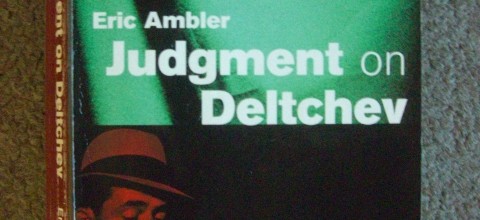Ambler – Judgement on Deltchev

I’m going to start making some rules here.
Rule 1 – I will not discuss non-fiction
Rule 2 – I will not discuss the books of writers I consider to be friends
Rule 3 – I will say what I like.
3 is important, because this is not a review process, it’s more like a eulogy, and necessarily, it’s going to become confessional.
Chef Rickard gave me Judgement on Deltchev. He might have meant only to lend it to me, but anybody who loaned me a book when I was in my teens was out of luck – I was a book thief by the simplest process of borrowing and never returning. It’s shaming to admit that, as one of the other books I’ll be talking about is still the centre of an unshiftable resentment – a book that was borrowed and lost and returned as a different edition. I’ll get to that … one day, maybe.
Rule 4 – I will not consider myself bound to follow through on any references I make to books other than the book under review. I will break my word if I choose.
So, Chef Rickard lent/gave me a carrier bag of books. Also in that eclectic batch were Mary Renault’s The Last of the Wine and one of Colin Wilson’s books on serial killers – I can’t remember which, and Wilson is so prolific that I have little chance of working it out from his bibliography.
I read them all, many times. I fell in love with Renault and Ambler and was horrified, fascinated and appalled by Wilson. Some of the activities he described in the early life of his serial killer were activities I was seeing around me every day in a busy hotel, or in the public gardens or on the beaches of a holiday resort in the 1970s when exploiting very young women – girls, and sometimes very young girls at that – was considered normal behaviour.
 It’s sickening, in the light of the Jimmy Savile scandal, to reflect back on that period, to remember that as I waited table in my parents’ hotel I took it for granted that married men in their thirties and forties would grope me – that I reserved the epithet ‘dirty’ for the ‘old’ men, those in their fifties and sixties, and that it never occurred to me to complain about the bruises, even nail marks, that I, and other waitresses, found on our backsides and breasts every week.
It’s sickening, in the light of the Jimmy Savile scandal, to reflect back on that period, to remember that as I waited table in my parents’ hotel I took it for granted that married men in their thirties and forties would grope me – that I reserved the epithet ‘dirty’ for the ‘old’ men, those in their fifties and sixties, and that it never occurred to me to complain about the bruises, even nail marks, that I, and other waitresses, found on our backsides and breasts every week.
So … back to Chef Rickard. He was a lovely man. He was calm (not a common attribute of chefs, in my experience), and economical in his work pattern; he read about a book a day (so did I) and had a loving family with whom he spent what little free time he had. Every few weeks he would bring me another batch of books, but it was that first bagful I remembered best. Years later, Chef Rickard was to cater my wedding. It was his gift to me, and I never thanked him adequately – I was a self-obsessed and ungrateful young woman, even beyond the normal self-obsessed narcissism of a bride-to-be – but I hope he knew just how much he meant to me, not for the catering, nor even the books, but because being able to discuss books with somebody was vital to me.
The thing is, if you grow up in a holiday hotel, and you are failing miserably at school, despite being clever, and you’re being bullied (but that’s not the reason you’re failing) then there are few ways to feel good about yourself. Soulless sex with random strangers works – but it’s high risk when you’re a teenager (that didn’t stop me, by the way) but books work better, and books that you can discuss with a calm, authoritative figure … they work really well.
A chef is a god. He’s the kitchen god, but he’s also the hotel god. A proprietor just owns a hotel – a chef makes one, or breaks it. So when ‘Chef’ (as all chefs are known) is talking to you, you are okay and nobody messes with you. We had a lot of chefs over the years: Jeff the Chef (he was a bit creepy, in the groping way described above, not with me but with others, and a knife waver), Chef Hardiman (another lovely chef, whose wife was his sous chef, but he didn’t read books) John the Chef (unstable, also given to waving knives very, very close to one’s face) and a plethora of come-and-go chefs who were either so unstable they got the boot, or were stable enough to not stick around when they met the rest of the neurotic kitchen and dining room team.
In any case, a chef is a god and being able to talk to a god, even a kitchen one, can carry you through a lot of other misery.
So can books, and one of the reasons I developed a fascination with Ambler was that his characters existed in worlds where two views ran in parallel – there’s the view they professed, and often even seemed to hold: that things are rather nice, or at least straightforward, and everybody’s doing their best. Then there’s the view that sometimes got glimpsed in mirrors and through the gaps in swift-closing doors and heard in whispers – the malicious, manipulative, frenetic underworld where nobody was what they said they were, nothing happened by accident and the wrong word or gesture could condemn everybody to death. It was a bit like the world I was living in, writ large. I was fifteen, taking (failing to take) O-Levels and working part-time in my parents’ hotel. That was the professed view.
The glimpsed view included the groping, the insane demands of working six months of the year and then having no work for six months, the growing up on a small island where I wasn’t a native and was therefore academically, socially and sexually expendable (or that’s how it felt) and the unspoken fact that while all this was going on, I was taking my clothes off for photographers who thought I was eighteen and, as a result, making more money in a single day that most people I knew made in a month – and nobody knew about it, except me and my agent, a man who shall be known as Fat Harry and who had a sleazy office over a pub in Portsmouth.
Judgement on Deltchev – this is not the copy Chef Rickard gave me, but it’s a keeper.



Recent Comments